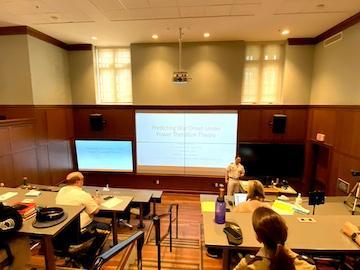Honors Week: Unveiling Key Insights on War Timing in Power Transition Theory
LEXINGTON, Va. May 20, 2024 — Devin Thomas ’24 presented insights into his honors thesis, “War Onset Power Transition Theory.” His findings included that wars are likely during phases of relative parity and both before and after power transitions. 
The power transition theory appealed to Thomas due to its focus on power dynamics and systemic changes, which have significant implications for international relations at various levels. Thomas initially encountered power transition theory in a Theories on War and Peace class with Col. J. Patrick Rhamey, professor of international studies, during his 3rd Class year. Rhamey eventually became Thomas' academic advisor for his senior thesis presentation for Virginia Military Institute's Honors Week.
Thomas became intrigued by the question of when wars are most likely to occur within the context of power transition theory. He noticed a gap in his academic literature regarding the specific timing of war onset before or after power transitions.
"When I was doing my initial research, fall of my 2nd Class year, this is what I was looking at,” explained Thomas. "It's like trying to find a question within power transition theory and the question became no one's really tackled this question of when is war most likely under it."
Thomas recognized the practical implications of understanding power transitions and war onset and saw the research topic as important for policymakers and those involved in foreign relations.
This relevance fueled Thomas' interest in exploring the subject deeper. Drawing from his academic background, he integrated insights from various theories, including realism, liberalism, and constructivism, to develop a comprehensive framework.
Collaborating with Rhamey, Thomas identified two causal mechanisms for his research: perception and misperception in international politics, inspired by Robert Jervis's work, and the concept of time horizons, drawn from David Edelstein's research.
During the following semesters, Thomas engaged in extensive literature review, theoretical development, and methodological training, culminating in both quantitative analysis and qualitative case study work.
Thomas elected rigorous coursework like an International Studies Research Design class, which equipped him with the necessary skills for research design and execution leading up to his culminating presentation during his last year at VMI.
He collected various datasets pertinent to his research question, encompassing gross domestic product, state capacity, militarized interstate disputes, and United Nations General Assembly
voting similarity. Employing a blend of quantitative analysis techniques and qualitative research methods, Thomas analyzed the data, using techniques such as interactive logic regression to scrutinize his hypothesis quantitatively.
“Beyond demonstrating research excellence in the scientific study of international politics, Cadet Thomas’ research also has clear policy implications that allow government to anticipate the timing of conflicts globally,” said Rhamey. “I directed Cadet Thomas to relevant research on his topic to help him develop his project into one that was both targeted to a specific research question and accomplishable within the limited time frame of Institute Honors.”
"The international studies department does a great job of wrapping it all in and allowing you the most time possible to work on your thesis," said Thomas. "He was having me do a lot of research because the foundation of power transition theory, the two independent variables, are the reaching parity and the dissatisfaction of the rising challenger. But that doesn't really get to the question of the timing and the why for the timing."
Thomas said his research has helped him understand how the political world operates, mainly through the lens of power transition theory, which examines wars with systemic consequences.
"I think I've gained a much greater understanding for, in a pragmatic sense especially, how the political world works," Thomas said.
Thomas said this experience has not only deepened his academic insights but also influenced his career trajectory, steering him to pursue military intelligence and strategic analysis roles after graduation, where he can apply his knowledge to current international issues.
Rhita Daniel
Communications & Marketing
VIRGINIA MILITARY INSTITUTE
.svg)
.png)